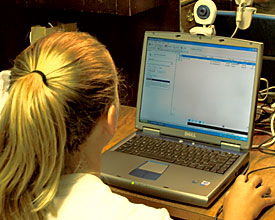 |
|
MALLORY LORING/Arizona Daily Wildcat
|
A University of Arizona student downloads music in Gila dorm Monday evening. File sharing is an act, which can be punished civilly or through the university if done with copywrited material.
|
|
|
By Ian Musil
Arizona Daily Wildcat
Thursday August 28, 2003
Although the UA has felt the heat from record companies cracking down on students who download music, UA students aren't flinching.
"No one is really scared. They should warn us a lot more than they do," said pre-business freshman Kristina Johnson, when asked how she feels about the record industries' lawsuits against students this summer.
For the first time, The Recording Industry Association of America began cracking down last April on students downloading music, filing a suit saying four students running Napster-like file sharing software at Princeton University, Rensselaer University and Michigan Technical University caused them to lose nearly $100 million in damages.
"I don't think it's going to stop anyone," said undeclared freshman Marc Lebowitz in response to news of the lawsuits.
Many colleges, including DePaul, Northeastern and Boston College, have been targeted recently by record industry subpoenas that demand they turn in the names of illegal downloaders on their networks.
The UA hasn't received any subpoenas, but since January the RIAA has sent over 310 official notices of copyright infringement to the university.
"It's intensifying. Industry is stepping up their effort to crack down on student sharing copyrighted files," said Karen Williams, the copyright librarian who handles complaints from the record industry.
The UA is not policing their own network, but due to the Digital Millennium Copyright Act passed in 1998 to protect digital content from infringement, UA officials are forced to respond to official complaints from the industry.
When a student's ip address is named in a notice of copyright infringement, the university is obligated to act, said Steve Gilmore, assistant director of residence life.
The first action taken by Residence Life is the distribution of a written warning to the student who owns the ip address named by the industry.
After being warned, the student must remove all illegally obtained copyright material. If a student is caught again and named in a second letter from the RIAA they are referred to the Dean of Students' Office.
Sanctions from the dean can include eviction from the residence halls and a permanent loss of network privileges.
No infringements have resulted in permanent punishments from the dean.
In response to pressure from the recording industry and in attempt to stop illegal file sharing on the UA network, CCIT tweaked network preferences to limit how fast students could download files from their peers in 2002.
That change slowed file sharing so that sometimes it took students up to 3 hours to download music. But that hasn't been enough.
"Everybody uses Kazaa (a popular file sharing software)," said Lebowitz.
